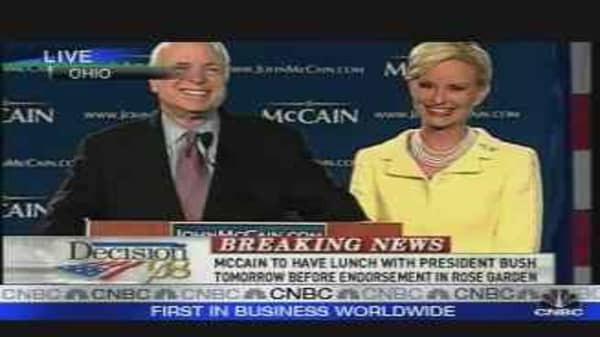Senator Hillary Rodham Clinton defeated Senator Barack Obama in the Ohio and Texas primaries on Tuesday, ending a string of defeats and allowing her to soldier on in a Democratic presidential nomination race that now seems unlikely to end any time soon.
Mrs. Clinton also won Rhode Island, while Mr. Obama won in Vermont. But the results mean that Mrs. Clinton won the two states she most needed to keep her candidacy alive. Her victory in Texas was razor thin and came early Wednesday morning after most Americans had gone to bed. But by winning decisively in Ohio earlier in the night, Mrs. Clinton was able to deliver a televised victory speech in time for the late-night news. And the result there allowed her to cast Tuesday as the beginning of a comeback even though she stood a good chance of gaining no ground against Mr. Obama in the hunt for delegates.
“No candidate in recent history — Democratic or Republican — has won the White House
without winning the Ohio primary,” Mrs. Clinton, of New York, said at a rally in Columbus, Ohio. “We all know that if we want a Democratic president, we need a Democratic nominee who can win Democratic states just like Ohio.”
Although Mrs. Clinton won the popular vote in Texas, her hunt for delegates was complicated
by the state’s peculiar nominating process, which includes a separate caucus that awards 35 percent of the state’s delegates, irrespective of the primary results. Mr. Obama held a slight lead in that contest with less than half of precincts reporting, but the outcome is likely to stay up in the air until later on Wednesday.
The Associated Press reported that all told, Mr. Obama retains his lead in the delegate count, with 1,477 pledged delegates compared to Mrs. Clinton’s 1,391. The A.P. said that 170 delegates from Tuesday’s contests have yet to be assigned, many from the Texas caucuses.
On the Republican side, Senator John McCain swept to victory in Ohio, Rhode Island, Texas and Vermont and claimed his party’s nomination, capping a remarkable comeback in his second bid for the presidency.
Mr. McCain’s main remaining rival, Mike Huckabee, a former governor of Arkansas, announced he was dropping out minutes after the polls closed and pledged his cooperation to Mr. McCain. Aides to Mr. McCain said he would head Wednesday morning to Washington to go to the White House and accept the endorsement of President Bush, his one-time foe, and begin gathering his party around him.
Mr. McCain, of Arizona, delivered his victory speech in subdued tones to a boisterous crowd of supporters in Dallas.
“Now, we begin the most important part of our campaign,” he said, “to make a respectful, determined and convincing case to the American people that our campaign and my election as president, given the alternatives presented by our friends in the other party, are in the best interests of the country we love.”
Mr. McCain proceeded to offer a preview of attacks for his Democratic rival. “I will leave it to my opponent to propose returning to the failed, big-government mandates of the ’60s and ’70s to address problems such as the lack of health care insurance for some Americans,” he said. “I will campaign to make health care more accessible to more Americans with reforms that will bring down costs in the health care industry without ruining the quality of the world’s best medical care.”
Mrs. Clinton’s twin victories in Ohio and Texas gave her, at the least, a psychological boost after a tough month in which she watched Mr. Obama, of Illinois, roll up victory after victory and build a lead in delegates. There was virtually no chance that Mrs.
Clinton could have survived had she lost Ohio and Texas; her husband, former President Bill Clinton, said last month that his wife needed to win both states.
Mrs. Clinton is already planning ways to capitalize on her performance; she is scheduled to appear Wednesday on all the morning news programs. But she will continue to find herself in a difficult position mathematically. Given the way the Democratic Party allocates delegates, it remained unclear whether Mrs. Clinton would close Mr. Obama’s lead on that front.
Even before the polls closed, Mr. Obama’s aides said that given their lead in delegates over Mrs. Clinton, it was not possible for her to catch up in the few remaining contests.
Mr. Obama came out shortly before midnight to speak to a crowd in San Antonio, and laid out the argument his campaign would make in the days ahead.
“No matter what happens tonight,” he said, “we have nearly the same delegate lead that we did this morning, and we are on our way to winning this nomination.”
But Mrs. Clinton’s supporters, exultant over the victory, tried to cast the results in Ohio and Texas as a turning point.
Mrs. Clinton took the stage in Columbus before a sea of waving white-and-blue “Hillary” signs and immediately portrayed her victory in Ohio as an indication of her electability in a general election. And she reprised a line of criticism against Mr. Obama that appeared to have gained her some traction in this contest.
“Americans don’t need more promises,” she said. “They’ve heard plenty of speeches. They deserve solutions, and they deserve them now.”
As she spoke, the crowd responded with chants of “Yes, she will!” — apparently an orchestrated response to Mr. Obama’s trademark “Yes, we can!”
Turning one of Mr. Obama’s themes against him, she said, “Together, we will turn promises into action, words into solutions and hope into reality.”
The results left the two parties at very different stages of the race. Mr. McCain’s nomination has been all but assured for almost a month. His campaign looked to the results on Tuesday as an opportunity to begin framing the contest ahead. In contrast to his previous victory speeches, Mr. McCain made no mention of Mr. Obama, presumably because the result when he spoke was hardly clear.
Nonetheless, Mr. Obama called Mr. McCain at 8:30 p.m. on Tuesday from his hotel room in San Antonio to congratulate him and to say he looked forward to running against him, said Mr. Obama’s press secretary, Robert Gibbs. Mrs. Clinton said much the same in her speech.
The voting proceeded on a day of problems at the polls in both states, in part because of a recurrence of the huge turnouts that almost every contest to date has experienced. In Ohio, the Obama campaign asked a judge on Tuesday to keep polls open longer in Cuyahoga County because of paper ballot shortages.
The Texas vote was actually two contests: a primary, where two-thirds of the delegates were selected, followed by a caucus, where the remaining one-third were selected. The Clinton campaign claimed irregularities by Mr. Obama’s supporters who, Mrs. Clinton’s aides said, sought to gain improper advantage in the caucuses.
In an illustration of the tension between the two campaigns, Bob Bauer, an election lawyer for Mr. Obama, called into a conference call arranged by the Clinton campaign.
The call had been set up to discuss the Texas caucuses, and Mr. Bauer challenged the assertions being made by Howard Wolfson, Mrs. Clinton’s communications director. The men, referring to each other by first names, engaged in a testy seven-minute exchange.
For Democrats, and particularly for Mrs. Clinton, the contests were as consequential as any to date. To that end, Mrs. Clinton delivered some of the toughest attacks of her campaign over the weekend, including a television advertisement in Texas that challenged Mr. Obama’s national security credentials and attacks on Mr. Obama in Ohio over free trade and a meeting his economic adviser had with a Canadian diplomat about the North American Free Trade Agreement.
There was evidence that the attacks had some effects. Mrs. Clinton did well among the 20 percent of voters in both states who said they made their decision in the last three days. She won about 60 percent of those voters in Texas and about 55 percent of those who voted in Ohio, according to exit polls conducted statewide by Edison/Mitofsky for the National Election Pool.
Surveys of voters leaving the polls showed Mrs. Clinton doing well among Hispanics in Texas, a major target for her there, as well as among lower-income voters and women in Ohio, suggesting that she was reassembling the coalition that had broken down in her losing 11 straight state contests to Mr. Obama over the past month. Mr. Obama was showing strength among black voters who made up 20 percent of the Democratic electorate in both states.
In Ohio, Mrs. Clinton’s emphasis on economic issues helped her to some extent. Three-quarters of respondents said they were concerned about their families’ financial situation, and more than half of those voted for Mrs. Clinton. She also won a majority of union households in Ohio and, in a reversal of her standing in early races, won decisively among white men.




